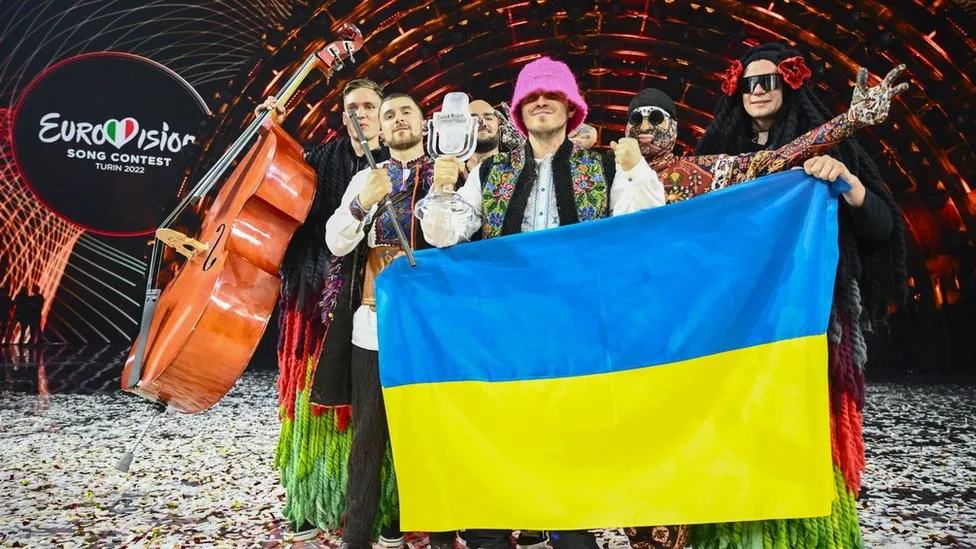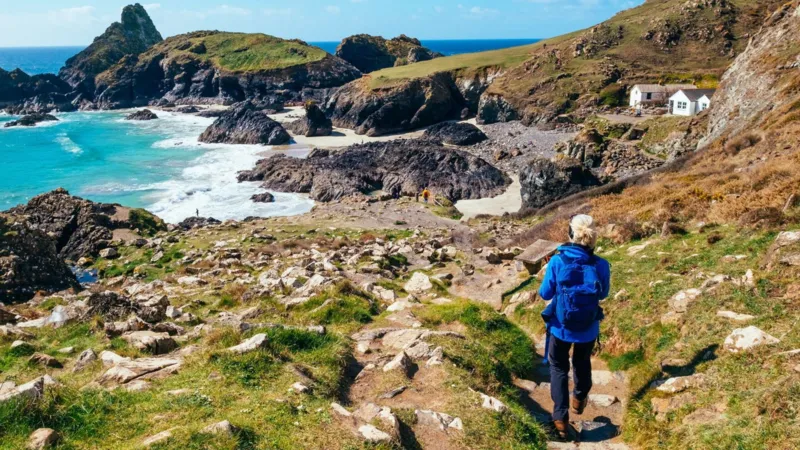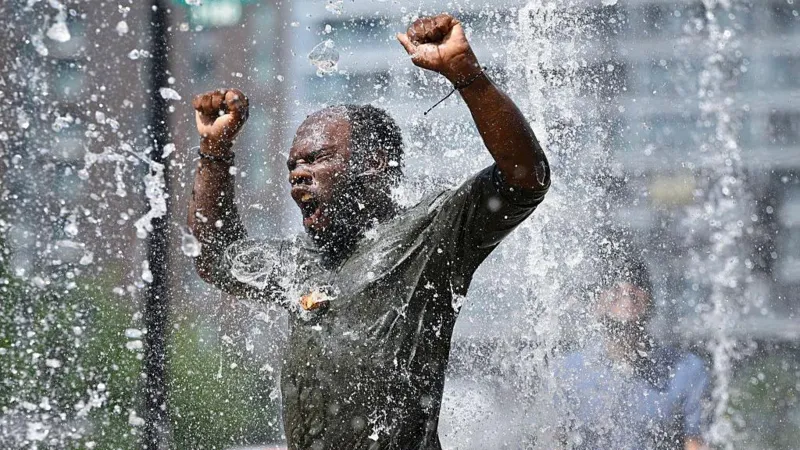Eurovision 2023: Contest inspires Ukraine's LGBT troops
As 2022 Eurovision winner, Ukraine is guaranteed a place in the Eurovision final on 13 May. When TVORCHI takes the stage in host city Liverpool, it will be a moment to savour for the country's LGBT troops.

"I didn't know if I would make it," says Antonina Romanova, a soldier who has been fighting on Ukraine's front line.
"I had to walk two kilometres under strong fire in the mud, in the rain, at night - with the mortar and all the equipment, which was extremely heavy. It was beyond my physical capability. I doubt I could go through that again."
This is the reality for Antonina, who identifies as non-binary and who, with her partner of nine years Oleksandr, took the decision to leave their lives as theatre directors in Kyiv and fight the Russian army. "Another world" is how Oleksandr describes it.
It's a step they took soon after Russia invaded Ukraine in February 2022. Talking to them via webcam, it's impossible to imagine all that they have been through over the last 14 months.
Their work has ranged from digging trenches and ducking gunfire, to feeding 150 soldiers in the frontline military canteen - the toughest gig of all, they only half joke. They have also had to learn from scratch how to use mortars - and have been firing them over the snow through the long, harsh winter.
Now, some much-needed light relief is just around the corner.
"We are looking forward to seeing Ukraine perform in Eurovision this year," says Oleksandr. "We've had very difficult times. And Eurovision is like a breath of fresh air… because when you see people doing what they like, and enjoying what they're doing and that life is still going on… When you see people in Europe supporting Ukraine: that's very important. Especially when you're on the front line."
But the razzamatazz, the strutting, the shimmying and the songs all seem a very long way from frontline warfare. Why is Eurovision something they care about?
"It is a very important message that Europe supports us," explains Antonina. "And for people defending Ukraine with weapons in their hands, it's very important."
Both soldiers have fond memories of Kalush Orchestra's triumph, winning Eurovision for Ukraine in 2022. By then, daily life involved taking cover in bomb shelters. "It felt like a miracle that Kalush had a chance to represent Ukraine with dignity," says Oleksandr. "I thought, 'Oh my god, we won Eurovision, we're going to win this war!'" he laughs.
"It was very emotional," adds Antonina, who says she was left "speechless".
Turning his shoulder towards the camera, Oleksandr shows off a rainbow badge - which certainly pops against the green-greys of his military uniform. And they are both wearing another badge, which is more discreet, in army colours. A unicorn's head stares out. It's become an emblem of serving LGBT military in Ukraine. "Because lots of people said that there were no gay people in the army," smiles Oleksandr.
The couple expected to encounter homophobic, verbal and even physical aggression from fellow soldiers, having been beaten and pepper-sprayed in a random homophobic street attack before the war last year.
But overall, they've been pleasantly surprised. "It's more tolerant than we expected - and I think that is partly because of other LGBTQ military who came out," says Oleksandr, in a nod to soldier Viktor Pylypenko, who was considered a pioneer when he came out in 2018.
Another couple following in his footsteps is Pavlo Lagoida, 30 and Vladyslav Polishchuk, 20. Via webcam from the Odesa region, they explain they are on a holiday before being prepared to be sent to the front line.
For all the pressures they face, Pavlo says they also contend with some name-calling. "A lot of people believed that we are not able to take a gun into our hands and fight. And they believe that we are so delicate. Not masculine."
They sit with their arms interlocked throughout the interview - having become engaged only the day before. They hope same-sex civil partnerships will soon become possible in Ukraine.
"Ukraine's victory last year showed that Ukraine is invincible," says Vladyslav, a deadly serious expression on his broad face. "And that we can overcome any difficulties and adversities, whether it is a war or a contest. I believe it's a message to the whole world that despite the war we can show our creativity.
"It's also the message to Russia: No matter how the war is going, we still have this fighting spirit. And it doesn't break us. And nor does it break our creative spirit. And we will never fall to our knees before Russia."
For Antonina, the impact of Russian aggression is nothing new. She fled her birthplace, Crimea, when Russia invaded the peninsula in 2014 and moved to Kyiv. It's ironic that she might not otherwise have met Oleksandr and fallen in love.
Partly because of her background, Antonina has vivid memories of Ukraine winning Eurovision in 2016 with Jamala's song, 1944, about the deportation of Crimean Tatars under Stalin.
Although Antonina remains exiled from her homeland, she wants more for it than ending the horrors sent by Vladimir Putin. "I have a great hope that one day Eurovision will be held in Crimea," she says. "Because it's a sacred place for Ukraine. Since the war started in Crimea, it should be finished in Crimea."
It may be a very long time before Eurovision can be held in Crimea. But for these soldiers, despite everything, they continue to hope.
-bbc







